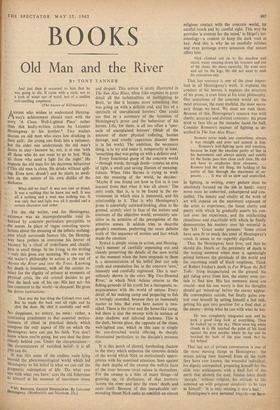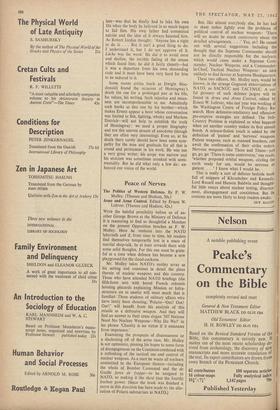BOOKS
Old Man and the River of his shoes, his shoes squelchy. He went over BY TONY
TANNER And just then it occurred to him that he was going to die. It came with a rush; not as a rush of water nor of wind; but of a sudden evil-smelling emptiness. . . .
(The Snows of Kilimanjaro.) ANYONE who wishes to understand Heming- way's achievement should start with the story 'A Clean Well-Lighted Place' rather than this badly-written tribute by Leicester Hemingway to his brother.* Two waiters discuss an old man who stays late drinking in their café: the young one finds him a nuisance, but the older one understands the old man's desire to stay—because he, too, is at one 'with alt those who do not want to go to bed. With all those who need a light for the night.' He respects the old man for his decorous behaviour (`This old man is clean. He drinks without spill- ing. Even now, drunk') and he starts to medi- tate on the nature of his own dislike of the darkness.
What did he fear? It was not fear or dread. It was a nothing that he knew too well. It was all a nothing and a man was nothing too. It was only that and light was all it needed and a certain cleanness and order.
For the old waiter, and for Hemingway, existence was an incomprehensible void in- habited by concrete particulars perceptible to the senses. In place of vague consoling specu- lations about the meaning of the infinite nothing- ness which surrounds human life, the Heming- way hero prefers to overcome his horror of vacancy by a ritual of orderliness and cleanli- ness in small things. In the living, in the writing —only this gives any meaning. We can see the old waiter's philosophy in action at the end of Across the River and into the Trees. Knowing his death is imminent, with all the animal in- stinct for the dignity of privacy at moments of physical crisis, the old colonel decides to get into the back seat of his car. His last act—his last comment to the world—is eloquent. He gives the driver instructions: That was the last thing the Colonel ever said. But he made the back seat all right and he shut the door. He shut it carefully and well.
No sloppiness, no outcry, no mess: rather, a continuing attachment to that essential meticu- lousness of ritual in practical details which compose the only aspect of life on which the Hemingway hero can pin his faith. You don't know where you're going, but you shut the door cleanly behind you. Under the circumstances— the circumstances of vanished belief—it is all You can do.
It was this sense of the endless nada lying beyond the phenomenological world which led Hemingway to his belief in what we can call the pragmatic redemption of life. `Do what you Can with what you have,' says the old fisherman to himself at his moment of maximum stress * MY BROTHER, ERNEST HEMINGWAY. By Leicester Hemingway. (Weidenfeld and Nicolson, 25s.) and despair. This notion is nicely illustrated in The Sun Also Rises, when Jake explains in great detail all the technicalities of bullfighting to Brett, `so that it became more something that was going on with a definite end, and less of a spectacle of unexplained horrors.' One could use that as a summary of the intention of Hemingway's prose and the behaviour of his heroes. Life, for them, is all too often a 'spec- tacle of unexplained horrors' (think of the amount of sheer physical suffering, human damage, and cruelly capricious disaster there is in his work). The ambition, the necessary thing, is to try and make it, temporarily at least, 'something that was going on with a definite end.'
Every functional grasp of the concrete world —through words, through deeds—creates an area of light, a small and saving illusion of meaning- fulness. When Jake Barnes is trying to work out the meaning of the world, he decides: `Maybe if you found out how to live in it you learned from that what it was all about.' The only truth, that is, is to be found in the en- vironment in which man is immersed, and his relationship to it. That is why Hemingway's prose is essentially outward-looking, close to the ground, acutely alert in face of the texture and contours of the objective world, reverently sen- sitive in its notation of the perceptions of the attentive senses. It seldom tries to describe people's emotions, preferring the more definite truth of 'the sequence of motion and fact which made the emotion.'
Syntax is simply vision in action, and Heming- way's manner of carefully separating out and cleanly preserving the details of the seen world at the moment when the hero responds to them is a demonstration of his belief that our sole truth and consolation lies in the concrete 'now,' intensely and carefully registered. This is mar- vellously shown in the story 'Big Two-Hearted River,' in which Nick Adams returns to the fishing grounds of his youth for a therapeutic re- acquaintance with the world of nature. Every detail of his making camp and preparing to fish is lovingly recorded, because they so immensely matter to him. But even here nature is two- sided. There is the river and the home-like camp, but there is also the swamp with its menace of deep shadows and infected darkness. This is the dark, barren place, the opposite of the clean, well-lighted one, which in this case is simply the sun-drenched world offering its sharply illuminated particulars to the disciple's reverent eye.
It is this patch of dismal, foreboding shadow in the story which enhances the concrete details of the world which Nick so meticulously appro- priates with his sensitised attention. Seen against the dark depths of the swamp the well-lit facts of the river become vivid values in themselves. For the swamp is a hint of many things—of growing up, of disillusion, of that territory 'across the river and into the trees,' death and nada itself. Because of this ineradicable sur- rounding threat Nick seeks to establish an almost religious contact with the concrete world, by careful touch and by careful sight. This way he provides 'a content for the mind,' in Hegel's ter- minology—a content to keep the dark void at bay. And this is why he so carefully relishes and even prolongs every sensation that nature offers him.
Nick climbed out on to the meadow and stood, water running down his trousers and out and sat on the logs. He did not want to rush his sensations any.
That last sentence is one of the most impor- tant in all Hemingway's work. It explains the conduct of his heroes, it explains the structure of his prose, it even hints at his total philosophy. Our sensations of the concrete world are the most precious, the most truthful, the most neces- sary things we have. We must not rush them. Because of this, Hemingway's concern was with clarity, accuracy and distinct contours: his prose tried to face life as the matador faced the bull. Consider Romero's manner of fighting as de- scribed in The Sun Also Rises:
Romero never made any contortions, always it was straight and pure and natural in line. . . . Romero's bull-fighting gave real emotion, because he kept the absolute purity of line in his movements and always quietly and calmly let the horns pass him close each time. He did not have to emphasise their closeness. . . . Romero had the old thing, the holding of his purity of line through the maximum of ex- posure. . . . It was all so slow and controlled,
In fighting, in writing, every gesture must be absolutely focused on the job in hand: every move must be unhurried, unhampered and con- trolled. The beauty and vitality of the work of art will depend on the maximum exposure of the artist to experience, the linear clarity and purity with which he gradually asserts his con- trol over the experience, and the exhilarating cleanliness and exactitude with which he finally demonstrates his mastery over his material in the 'kill.' Grace under pressure.' Some critics have seen fit to mock this tenet of Hemingway's creed. It seems to me superbly dignified.
. Thus the Hemingway hero lives, and thus he should die. Death or the proximity of death is the testing moment when man is agonisingly poised between the plenitude of the world and the oncoming smell of black emptiness. Think of Robert Jordan's death in For Whom the Bell Tolls: lying incapacitated on the ground, his girl riding away from him, the enemy soon cer- tain to find him. His last moments alone are crucial—and his one worry is that his thoughts should get 'mixed-up' before the enemy appear. He contemplates suicide, but finally gains con- trol over himself by setting himself a last task, getting his gun into position for a final shot at the enemy—doing what he can with what he has.
He was completely integrated now and he took a good long look at everything. Then he looked up at the sky. There were big white clouds in it. He touched the palm of his hand against the pine needles where he lay and he touched the bark of the pine trunk that he lay behind.
That last act of private communion is one of the most moving things in Hemingway: the senses taking their farewell from all the truth they have ever known, the wounded individual, his dignity unimpaired, preparing himself for the slide into nothingness with a final feel of the earth that abideth for ever. Jordan takes death 'straight,' without religion, his attitude to life summed up with poignant simplicity as he says to himself: 'It is only missing it that's bad.'
Hemingway's own personal tragedy—or hero-
ism—was that he finally had to take his own life when the body he believed in so much began to fail him. His own father had committed suicide and the idea of it always haunted him. As Robert Jordan thought: 'Anyone has a right to do it. . . . But it isn't a good thing to do. I understand it, but I do not approve of it. Ldche was the word.' He did it to avoid mess and decline, the terrible failing of the senses which faced him; he did it fairly cleanly—but it was a departure from his own demanding code and it must have been very hard for him to be reduced to it.
Some recent critics (such as Dwight Mac- donald) found the occasion of Hemingway's death the cue for a prolonged jeer at his life, his values, his writing. Such injustice and mean- ness are incomprehensible to me. Admittedly such books as this one by his brother—which makes Ernest appear a boor whose conversation was limited to fish, fighting, whisky and Marlene Dietrich—will not help to establish the truth of Hemingway: we need a proper biography and not this uneven stream of anecdotes (though they are often very interesting). Even so, at his death there surely should have been some sym- pathy for the man and gratitude for all that is sound and permanent in his work. He was not a very great writer; his scope was narrow and his stoicism was sometimes streaked with senti- mentality. But he did what only a few do: en- hanced our vision of the world.







































 Previous page
Previous page